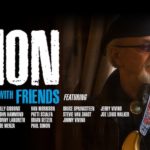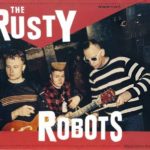I really like it when in one work of art you can find small references to another creation of mankind – and you walk along them, as if on bread crumbs, from one island of culture to another. And the further these islands are from each other, the more pleasant this intercultural journey becomes. So, I learned about the movie Crossroads 1986 from a game called Motorstorm, which was released 21 years after the release of the film – in 2007. Motorstorm and Crossroads have almost nothing in common – except for one name and literally a couple of phrases that you might not even notice. But, fortunately, I did not pass by these references, and I can only thank those who decided to pay tribute to the old film in their creation: I discovered not only a great game, but also an equally great movie.
So, Crossroads tells us a story about a guy named Eugene Martone – a fan of the blues in general and Robert Johnson in particular. One day Eugene finds out that Bob’s old friend Willie “Blind Dog” Brown is alive and whiling away his days in a nearby nursing home. Martone goes to see Brown in the hope that he will play him Johnson’s legendary thirtieth song…

Crossroads is built in an extremely interesting way: the film is shown as realistically as possible, but at the same time there is an element of mysticism in it – and all this is served almost as an autobiography. Such an unusual interweaving works, not least thanks to the traditional folklore of the south of the USA, which appeared back in the days of the Wild West: the Devil and his brothers walk among the human race without hiding, in the guise of exactly the same people as you and me – and it’s hard to figure out if you really met the lord of the underworld or just talked to a madman. Actually, Eugene, apparently, did not fully believe for the whole movie that he had met the master of hell.

Martoun’s character is played by none other than Ralph Macchio, who previously appeared in The Outsiders movie. I have no idea who he was playing there, but he was probably crying his eyes out there. At the same time, no matter how funny it may sound, but in the movie about the blues, he did not shed a tear, and the only moment where it could be done, shows us the character in the pouring rain. The Crossroads seems to show the viewer that it is not necessary to cry every five minutes to show the emotional experiences of the hero – and, fortunately, Macchio coped with this role. However, the fact that he can not only shed tears, Ralph showed two years before the Crossroads in the movie The Karate Kid – there were no complaints about his acting then, and there are no complaints this time.

Willie Brown is played by Joe Seneca – not a very famous musician and not a very famous actor. And if his music doesn’t stand out in any special way, then Joe’s acting skills are just too much. His charisma literally rushes forward and drags all the other participants of the film with it – and they clearly can’t keep up with it. A lot of this is facilitated by the specific role and excellent dialogues of the character of Seneca – the old grumpy Willie Brown, who constantly throws out all sorts of tricks and flaunts phrases like “Muddy Waters invented electricity!”, “A man is not a man if he does not have a car” and “Welcome to Bluesville, son.” The Blind Dog appears before us as a bluesman and, quite likely, the coolest dog in all of America, despite his age: Willie makes it clear with all his appearance that the changing world has long since bent under him, and Brown rocks this world as and when he wants.

It is also worth mentioning that the name of the character and his biography has certain similarities with the real musician who died in 1952. The film takes place in the mid-eighties, but we are never told directly whether this is Willie Brown, who somehow lived an extra 30 years, or another. This is facilitated by the biography of the real Brown – many musicologists believe that another Willy Brown, if not several, got into it, especially in the early stages. And this fact is played out in the film itself; literally at the very beginning, the Blind Dog declares: “I have six cousins named Willie Brown. The grocer on this street works – and his name is also Willie Brown. If they gave me a nickel for every Willie Brown, I wouldn’t be sitting here right now.”

And it would be wrong not to mention a few words to Jamie Hertz, who plays a girl named Frances. I’ve never seen a movie with Miss Hertz before, and I don’t know who it is, and even though at the Crossroads her acting talents are clearly inferior to both Seneca and Macchio – nevertheless, she is not an absolute log and is able to show quite believable emotions. Her character plays one of the key roles in the plot of the film, and it’s quite nice to watch her. At least, during the viewing, I didn’t notice much of a lack of acting – rather later, reviewing the moments I liked, I drew attention to it.
But in general, all three characters work well with each other: Willy and Eugene converge like father and son like gears in a Swiss watch, and the chemistry between Macchio and Hertz, though not very strong, is still very noticeable and believable.

The plot of the film seems to show us the formation of Comrade Martoun as a blues musician, but the truth is that this happens in a somewhat unusual way: Eugene knows how to play from the very beginning of the film, and the Blind Dog only advises him to use the slide. This is where the training, as such, ends – Crossroads rather preaches something that, to one degree or another, applies to almost all musical cultures.: You don’t play the real X until you’ve done Y. Willy says in plain text that the main character of the picture does not have enough “mileage” – in other words, you can’t play the right blues until you feel this very blues. “The blues is nothing else when a good person is overcome with longing …” – this is how the quote from the film begins, which, in fact, marks the end of the main character’s training.How much to agree with such a romanticization of music – everyone decides for himself.

Speaking of music: Ralph Macchio is still not a musician, and therefore a solid part of the music for his character in this film was written by Ry Cooder and Steve Vai – the latter also appears on the screen as a minor antagonist. It is clear that with such mastodons of music as Cooder and Vai, the soundtrack of the film simply could not turn out to be bad – and, like all good OST’s, it was released on a separate disc. Ry Cooder once mentioned that he had been working on the sound for a year – and you can feel it, because the blues in the film turned out to be beyond praise. Using the attached link, you can download the soundtrack itself, as well as three tracks that Steve Vai released later in a separate compilation (which, apparently, were simply cut directly from the film). Many tracks are present only in the performance, somewhat different from what was in the film, and a couple are completely absent, but it is impossible to find anything else in principle.
Download the soundtrack from the movie Crossroads (mp3, 94 Mb)
In general, Crossroads leaves only pleasant impressions. The only downside is that the film turned out to be perhaps too realistic, and this gray coating of everyday everyday life is somewhat depressing. But this is really the only drawback that I could find, and otherwise the Crossroads turned out to be beyond praise. Every blues fan simply has to watch this movie, because I haven’t seen a single blues picture that swings so much. And after watching it, there is a feeling that every time one musical style collides with another from the peak of popularity, somewhere on the edge of civilization, an old and a new legend come together in a duel under the gaze of the Devil.














I checked the Intersection the other day. I’ve only ever seen a guitar duel from it before. Interestingly, Steve Vai also played Paganini’s “Caprice” himself, the part that marked Eugene’s victory (Eugene’s blues parts were played by Ry Cooder). The movie is good. I especially liked Willie’s phrase: “If your hands didn’t get off the guitar because they don’t get off that girl’s ass, then maybe you would be useful!”
Willie actually has a whole package of similar phrases in this movie, one better than the other.
A soulful filmer, already pressed down. (and thanks – I didn’t know about this movie)
I am very pleased that I helped you discover a good movie. You’re welcome!
I would also like to know that Miss Narcissa played